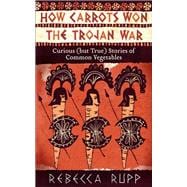
What is included with this book?
Rebecca Rupp has written more than a dozen books for children and adults, including Weather! and How Carrots Won the Trojan War. She holds a PhD in cell biology and biochemistry and has written hundreds of articles for magazines, including Country Journal, Early American Life, Mother Earth News, Natural History, and Utne Reader. She lives in Vermont.
The New copy of this book will include any supplemental materials advertised. Please check the title of the book to determine if it should include any access cards, study guides, lab manuals, CDs, etc.
The Used, Rental and eBook copies of this book are not guaranteed to include any supplemental materials. Typically, only the book itself is included. This is true even if the title states it includes any access cards, study guides, lab manuals, CDs, etc.